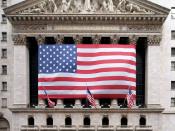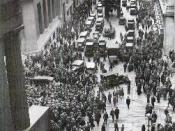Today, Governmental law and regulation seems to be the epitome of American capitalism. But this was not always the case; in the beginning, Wall Street was a ruthless environment with almost no laws or regulatory measures. Fraud, bribes, insider trading, market corners and an overall lack of precise accounting created a tremendously unbalanced market in which small shareholders were the primary losers. Men such as Cornelius Vanderbilt, Jay Gould, Jim Fisk, Daniel Drew and Andrew Carnegie were all guilty of taking advantage of the system and were eventually nicknamed "robber barons". Throughout John Steele Gordon's novel "The Great Game", a line is drawn that allows us to observe as Wall Street emerges, in the beginning, as a secondary market with few regulations; it was vulnerable to frequent instability. As the NYSE merged and developed as a world market, regulatory measures were necessary to assure the continued success should the bear markets be avoided.
Throughout the 150 year expansion, leaps forward, such as a central bank reserve, allowed the power of the NYSE seat holders to be usurped by a higher governing body. This permitted laws and regulations against schemes (e.g. insider trading, bribes, etc.) by these seat holders, creating a more trust worthy market with increased protection against any future crashes such as that of 1929. Presently a new threat has dawned upon Wall Street: the Internet. Brokers and brokerage firms are beginning to worry about the possibility of collapse due to drastic reduction of commission. Now, as technology flourishes and Internet day traders are numbering in the millions, the NYSE must follow in its previous foot steps, continuing control through regulations.
At its conception, Wall Street was a poorly organized institution, where a clear need for rules could be seen based on the transactions between its members. During...


